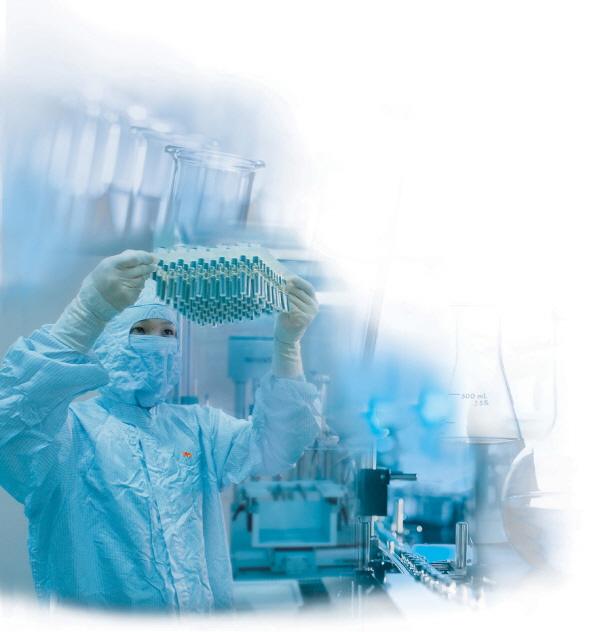● SK Chemical, One Last Step to Securing Vaccine Dominance
- Opens the path for domestication of cell culture Influenza vaccine with our
R&D technology
- Entered clinical stage 3; the goal is to commercialize by 2014
- Contribution in gaining vaccine dominance through collaboration of FDA and
governmental for Influenza departmentSK Chemical has entered the last stage of securing the vaccine dominance.
SK Chemical has a three-phase clinical planning of influenza vaccine that uses animal cell culture technology (a.k.a. cell culture vaccine) approved by the FDA and has entered phase 3 as reported on the 27th of this month.
This phase 3 will proceed for 9 months with the goal to find evidence for immunity and safety of the vaccine through adults and children subjects.
For adults, the clinical tests are done to both men and women over 19 years of age in Korea University Guro Hospital and 7 other facilities. For children, clinical tests will be done in approximately 10 facilities to children between 6 months and 18 years of age.
This entrance of phase 3 has been the first successful domestic achievement by SK Chemical and governmental program department* (Program Head Chief Prof. Wooju Kim, Department of Infective Medicine, Korea University). This was achieved in a year since phase 1 has been initiated last September.
Cell culture vaccine is a new technology of developing a vaccine after culturing the virus using animal cells. Previously, vaccines were produced through fertilized eggs, but 6 months for the production, unstable fertilized egg distribution, and the absence of alternatives for patients with egg allergies have been pointed out as the downsides.
On the other side, cell culture vaccine is a groundbreaking production method that may be produced in large quantities in a short period of time regardless of the supply of fertilized eggs, ▲is not affected by AI or other external factors ▲vaccination is possible to people with egg allergies ▲and shortens the production time to about 3 months.
Cell culture vaccine, especially, may respond quickly to cases of novel influenza or other pandemics. Internationally, Novartis, Baxter, and other pharmaceuticals have successfully commercialized by approaching national security. Other multinational pharmaceuticals are also in the process of development.
Prof. Wooju Kim of Korea University, who is leading this clinical program, stated that "if safety and effectiveness are verified through phase 3, vaccine dominance may be secured through expedite development and production of the pandemic influenza vaccine."
Bio Department head Man-hoon Park of SK Chemical Biotechnology laboratory, who established the production facility in Andong City, North Kyongsang Province, said that they were "able to enter phase 3 by establishing production process of high quality and high effectiveness through expeditious support from `private and governmental consulting bodies supporting commercialization`, a part of FDA [Vaccine self-supporting expansion program]." Park also revealed his ambitions by "contributing to national vaccine dominance by successfully achieving the development of the latest cell culture influenza vaccine."
Currently, SK Chemical has completed establishing large mass of “cell culture influenza vaccine production facility” through the support of “customized production support program for vaccine base materials of influenza and others”. This facility is established in Kyong-buk Bio Complex (Andong) for the first time in Korea.
Andong vaccine factory (L HOUSE) is constructed on the area of 63,000 m2 and has the ability to produce 140 million doses a year. It has facility conveniences, including production facility for base material and completed product, QC/QA facility, a warehouse, and pilot facilities for development of next-generation products.
Currently, this factory produces samples for clinical trial phase 3. From the second half of 2014 when phase 3 ends, it will have the vaccine production facility for the production of variety of vaccines, including influenza, by using the cell culture method. (End>
Novel Influenza Governmental Program Department(TEPIK :Transgovernmental Enterprise for Pandemic Influenza in Korea )With the goal of "strengthening research capacity and establishing collaboration system with governmental departments that secures the safety of the citizens from novel influenza", this has been launched by the Ministry of Health and Welfare on November 2010. For the security of basic and anticipatory response technology in relation to the threats by novel influenza, R&D budget was supported by the government and many research development efforts are made for new vaccines, treating agents, and diagnosis test developments, including establishment of research infra and long-term research development in the area of basic science, dynamics, and clinical trials.

[Photo Description] Researcher of SK Chemical Bio Science laboratory studies cell culture vaccine.